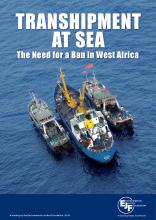Transshipment at Sea - The Need for a Ban in West Africa
The Environmental Justice Foundation (EJF) has found that many Western coastal countries in Africa have been unable to control and monitor transshipment at sea. These coastal countries have insufficient resources to inspect vessels before transshipment and instead rely on onboard observers monitoring for illegal activity, who have multiple shortcomings. With 37% of West African catch coming from IUU fishing, this activity puts marine management at risk and poses severe threats to the livelihoods of coastal countries' citizens. The EJF proposes banning transshipment at sea for these coastal countries, requiring them to work with the international community and improve their monitoring and control systems.
Language
